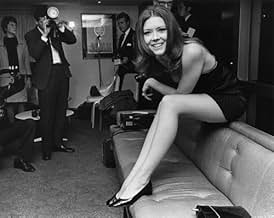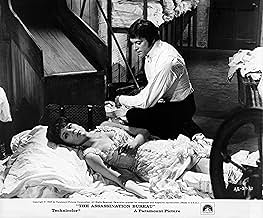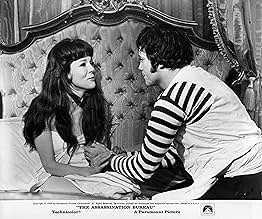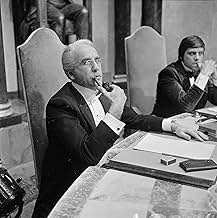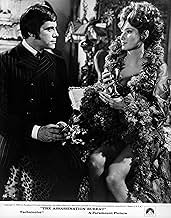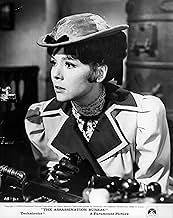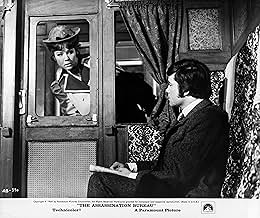A woman causes a group of assassins to face their greatest challenge.A woman causes a group of assassins to face their greatest challenge.A woman causes a group of assassins to face their greatest challenge.
- Awards
- 2 nominations total
Curd Jürgens
- Gen. von Pinck
- (as Curt Jurgens)
John Abineri
- Police Inspector
- (uncredited)
John Adams
- French President
- (uncredited)
Jonathan Adams
- French President
- (uncredited)
6.43.9K
1
2
3
4
5
6
7
8
9
10
Featured reviews
When Assassination was mere Amusement
To enjoy and even admire this period piece, set just before the industrial revolution of the 20th century, one has to understand what it is. It's certainly not a parody of James Bond or some off cue thriller; it's high comedy, a farce of magnificent proportions, aided & abetted by fine action. You have to get in on the joke with Oliver Reed, Diana Rigg, Telly Savalas and the rest, all obviously enjoying themselves, but not at our expense. Let them amuse you and bemuse you, and you'll have a grand time. By this point, over 35 years after this was filmed, it may be difficult for younger viewers to follow along with Reed and realize when he is winking at them during one of his outrageous pronouncements. He's the head of the organization of the title - it is what you think it is, no pretensions there - its business is killing people, for money. But that is about the only thing which is up front in this picture. Everyone is not who they seem to be, usually having a decent public face and the secret hidden one - the one catering to the less moral side of all of us.
This is probably my favorite Oliver Reed performance. He grabs the role of the debonair gentleman assassin and turns it into uniquely his own. Some of his dry line delivery, particularly when sparring with Rigg, is priceless; my favorite is when they meet and she informs him who she wants killed; he soon demands her reasons, yelling "Is That it? Is That It!?!" Later in the film, she calls him annoying. "I have been told that," he replies, but never have we heard the line spoken that way. He needs to carry the picture, outsmarting and fooling all the other sneaky assassins out for his blood with disguises, role-playing and careless bravado. This is where the picture really shifts into high gear, turning into a duel among a group of master killers who, luckily, do not yet have the advantages of 20th century weaponry. The supporting cast are all terrific, including Savalas as Reed's main nemesis, Jurgens as a German general and Noiret who, besides being an assassin, also runs a brothel (no limits to the French).
The script and dialog are continually witty throughout, many of the lines classic and too numerous to mention here. Again, some of this may be lost on anyone under 30 years old; in a way, this brand of humor can now be termed sophisticated - no gross bodily function joking. It does revolve around death, so a kind of dark farce results, of course - yet it's not morbid. That's probably because most of the victims deserve their ends as presented here; they made their beds, as it were. The dialog is complemented by inventive turns in the plot; there's actually quite a bit of suspense as the story turns & twists here and there, especially during the sequence in Venice, where the order of characters being killed is not as expected. The finale is also suspenseful - you may wonder how Reed will pull it off, stopping an entire zeppelin and its crew. And please keep in mind the special FX are over 35 years old, as well. Just glorious stuff.
This is probably my favorite Oliver Reed performance. He grabs the role of the debonair gentleman assassin and turns it into uniquely his own. Some of his dry line delivery, particularly when sparring with Rigg, is priceless; my favorite is when they meet and she informs him who she wants killed; he soon demands her reasons, yelling "Is That it? Is That It!?!" Later in the film, she calls him annoying. "I have been told that," he replies, but never have we heard the line spoken that way. He needs to carry the picture, outsmarting and fooling all the other sneaky assassins out for his blood with disguises, role-playing and careless bravado. This is where the picture really shifts into high gear, turning into a duel among a group of master killers who, luckily, do not yet have the advantages of 20th century weaponry. The supporting cast are all terrific, including Savalas as Reed's main nemesis, Jurgens as a German general and Noiret who, besides being an assassin, also runs a brothel (no limits to the French).
The script and dialog are continually witty throughout, many of the lines classic and too numerous to mention here. Again, some of this may be lost on anyone under 30 years old; in a way, this brand of humor can now be termed sophisticated - no gross bodily function joking. It does revolve around death, so a kind of dark farce results, of course - yet it's not morbid. That's probably because most of the victims deserve their ends as presented here; they made their beds, as it were. The dialog is complemented by inventive turns in the plot; there's actually quite a bit of suspense as the story turns & twists here and there, especially during the sequence in Venice, where the order of characters being killed is not as expected. The finale is also suspenseful - you may wonder how Reed will pull it off, stopping an entire zeppelin and its crew. And please keep in mind the special FX are over 35 years old, as well. Just glorious stuff.
Worth watching for Reed and Rigg
This film is an enjoyable enough lightweight romp, with an array of locations and actors that is perhaps excessive.
Oliver Reed is suavely bucaneering as the main protaganist, while the other main star, Diana Rigg of Avengers fame, does a very well-judged comic performance as the feminist journalist in 1910. It's a shame she didn't appear in more films. No other actors get much of a chance to shine, as there are far too many minor characters.
The writing is OK; you get the feeling that there should be more laughs than there are. Still, it's an enjoyable enough way to spend an hour and a half.
Rating:- *** (out of *****)
Oliver Reed is suavely bucaneering as the main protaganist, while the other main star, Diana Rigg of Avengers fame, does a very well-judged comic performance as the feminist journalist in 1910. It's a shame she didn't appear in more films. No other actors get much of a chance to shine, as there are far too many minor characters.
The writing is OK; you get the feeling that there should be more laughs than there are. Still, it's an enjoyable enough way to spend an hour and a half.
Rating:- *** (out of *****)
Holds up well over time
This charming film, made when Oliver Reed and Diana Rigg were at the height of their appeal, is what they used to call a "romp", when it wasn't considered to be a putdown. Reed, as Ivan, born and bred to lead an international group of highly-placed assassins, is hired by would-be reporter Sonia (Rigg) to have his group kill him, and realizing that his house badly needs some cleaning out, Ivan accepts the commission. The rest is a whirlwind tour of Europe, taking out substantial portions of the terrain as they go, avoiding bungled attempts on his life as he tries to track down the traitors who would turn the Bureau into a political machine. The dialogue is refreshingly devoid of political correctness, but maintains a firm respect between the unlikely couple as they go from bickering rivalry to bickering fondness. Guest villains include Clive Revill as a gluttonous Italian, and sad stories include the accidental demise of Roger Delgado (Dr. Who, the first Master) while on location. Much worth the time and effort, although sadly almost never seen on TV, and abysmally represented in video release.
Stylish; Beautiful; Colorful Hilarious and Action-Filled; Classic Satire
If the awestruck viewer of this lovely, spacious-looking and delightful satire can get past the multiple locales, the elaborate and often-sumptuous style and the sheer colorfulness of the goings-on, there is a solid and interesting plot line under propping the entire gorgeous edifice. Behind the overwhelming "stylishness" that first greets the eyes, and it is a wonderfully varied and colorful production, Jack London's fascinating story of the "assassination bureau" has been updated by writer Robert L. Fish to be an "ethical" idea gone wrong. The basic premise is that the pragmatic and cynical end of the 19th Century with its pseudo-Christian thug-like monarchs, dynasts and empire-builders was unjust to individual victims. because this situation led some to wish the worst offenders removed from their tyrannies and interferences, Ivan Dragomilov's father created the Assassination Baureau, Ltd. However, an instrument designed to remove the worst offending baddies from an imperfect world has now become a murder-for-hire problem. Enter Diana Rigg, who finds out how to hire the Bureau to take a contract on--Ivan Dragomilov, played intelligently by Oliver reed. He accepts the contract, recognizing what his father's "noble instrument" has been allowed to become. The remainder of the film's scenes then feature a long and fascinatingly funny duel between Rigg and Oliver and the bureau's chiefs, against whom Reed has declared war. These stalwarts include stalwarts such as the great Curt Jurgens in Germany, Cilve Revill in Italy, Telly Savals in London and others in Paris and elsewhere. Sweeping scenes such as the French bordello scenes, the German Restaurant duel, the hilarious Italian caper, the flaming-lighter escape on the train trick and others lead to the climactic race to save London from Savalas's explosive plot. The lovely mounting of the production is highlighted by Basil Dearden's wonderful ability with actors, blocking, and camera-work, Art Director Michael Relph's award-level contributions, magnificent costumes luminous lighting and many other achievements. Many other actors including Beryl Reed, Philippe Noiret and pretty Annabella Incontrera contributed; Ron Grainer's music is a great asset also. But I believe what sets this satirical thriller apart is its realistic ethical dimension; the fact that the Age of Empire was an age of evil governments and unethical pretensions by state tsars has not even now been recognized. This long and intensely-diverting film is a beautiful-polished needle that pricks a much-needed hole in the gasbag of public-interest-tyranny's post modernistic pretensions. It is a film that deserves to be laughed with, applauded and considered carefully for its positive sense-of-life and all-around sparkling wit, dialogue and spirit of adventurous fun.
Frothy Fun
After reading the other comments here, I wonder if these folks saw the same movie. This film is a lot of fun, a touch on the slap-stick side and it isn't supposed to be Bond OR the Pink Panther. Maybe the problem is generational??? Those of us who grew up in the far away and ancient times learned that there didn't have to be an action sequence every thirty seconds, lots of overt sex and toilet humor. These things are what seem to "make" a movie today and it's why a lot of people of my generation a) don't go to a lot of films today and b) really worry about the ones who think the named qualities are what make a movie "good". Oh, well. Every generation has to grow up. When they do, maybe they will find that The Assassination Bureau really is the laugh riot while The American Pies and What About Marys are noted to be rather--well--gross.
Did you know
- TriviaJack London's original novel was left markedly incomplete at the time of his death, and it was not until many decades later that the thriller-writer Robert L. Fish (also known as Robert L. Pike) finished it for publication, amidst much publicity. The novel is noticeably more serious in tone than this movie, although a New York Times review at the time called it "delightfully ridiculous."
- GoofsIn the scene about 40-45 minutes in where Lord Bostwick visits General Van Pinck whilst the latter is at fencing practice, there's a map of Europe on the wall. Although this film ostensibly takes place before World War I, the map is of post-Versailles Europe, c.1925-1939.
- Quotes
Miss Winter: With your ideas, I'm surprised you're shocked at the thought of war.
Ivan Dragomiloff: Not at all. It's purely a matter of business. How can we charge our sort of prices with everybody happily killing each other for a shilling a day?
- How long is The Assassination Bureau?Powered by Alexa
Details
- Release date
- Country of origin
- Languages
- Also known as
- El sindicato del crimen
- Filming locations
- Cliveden House, Taplow, Buckinghamshire, England, UK(Lord Bostwick riding in the woods towards Ruthenia)
- Production company
- See more company credits at IMDbPro
Contribute to this page
Suggest an edit or add missing content

